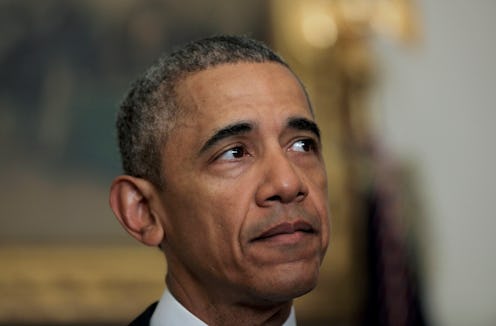News
Now, The Iran Deal Should Make You Question Obama
On Thursday news broke that the U.S. State Department said the increasingly controversial $400 million cash payment to Iran that was part of the President Obama-led Iran nuclear deal "was contingent on the release of American prisoners," according to an Associated Press report. In a summer (a year) where so much of the news cycle is dominated by the presidential election, the newly uncovered details about the Iran nuclear deal are easy to gloss over. Certainly, the story is not nearly as clicky as one about Donald Trump's latest offensive tweet, but the new information about the United States' handling of the Iran deal is (no pun intended) a big deal.
First, we need to backtrack. It was already known that the United States had agreed to pay $1.7 billion to Iran to settle a financial dispute dating back to a deal between the two countries from when Shah Mohammad Reza Pahlavi was in power in the 1970s. The announcement of the payment coincided with the announcement of the release of American prisoners from Iran in January. It wasn't until early August, though, that it was uncovered that the United States had paid $400 million in cash to Iran in a "secretly organized airlift" as the first installment on Jan. 17 — the same day the prisoners were released — as the Wall Street Journal first reported.
This report raised red flags. Republican Sen. Tom Cotton was one of many top GOP leaders to denounce the exchange as ransom payment, telling the Wall Street Journal, "This break with longstanding U.S. policy put a price on the head of Americans."
Still, the Obama administration flat-out rejected any cries that this was a ransom deal. Obama said earlier this month in a press conference that the payment was done in cash because the United States and Iran have no banking relationship. He added, "We do not pay ransom for hostages. We didn’t here, and we won’t in the future, precisely because if we did we’d start encouraging Americans to be targeted."
However, on Thursday, State Department spokesperson John Kirby said the United States "withheld delivery of the cash as leverage until the U.S. citizens had left Iran." If that sounds sort of (or a lot) like a ransom to you, you're not the only one.
What's even more troubling, though, is that these remarks arguably contradict what Kirby said earlier this month when questioned about the $400 million payment to Iran by the Wall Street Journal. "As we’ve made clear, the negotiations over the settlement of an outstanding claim … were completely separate from the discussions about returning our American citizens home," Kirby said in an article published Aug. 3.
Kirby said on Thursday that this exchange still didn't count as paying ransom because Iran was "going to get this money anyway because the Hague tribunal decided that they were going to get their money back."
These latest details on the Iran deal exchange are especially damning for the Obama administration for some critical reasons. One, is that it's sounding more and more like the White House did, in fact, agree to a deal that resembles paying a ransom for hostages — and such a move would be unprecedented in the scope of U.S. hostage practices. Another is that it seems that, at the very least, the Obama administration was not forthcoming and may have even obscured the details of the Iran nuclear deal, which, as of a Gallup poll from February, only 30 percent of Americans approve of.
